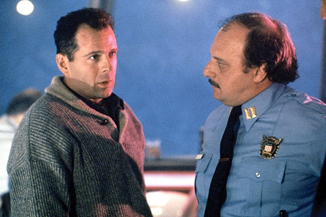Chapter Two: Lethal Weapon 2 vs. Die Hard 2
By Brett Ballard-Beach
November 8, 2012
A flurry of stats and figures to kick things off: Joel Silver produced both films under the microscope in this week’s column. Silver produced the entirety of the Lethal Weapon series and the first two Die Hards, as well as The Matrix trilogy and most of the big budget action flicks that Jerry Bruckheimer hasn’t been involved with. Lethal Weapon 2 is the highest grossing installment of either franchise domestically and pulled off the best improvement on its predecessor grossing more than 2x the take of the original. The Die Hard series has grossed over a billion dollars worldwide. The Lethal Weapon series encompasses four installments spanning 1987-1998 (any talk of a new chapter now involves the word “reboot” and does not seem likely to involve any original cast members.) The Die Hard films stretch from 1988 to the present with a fifth feature due next President’s Day weekend. Both series spawned a wake of imitators and copycats for their respective genres - the buddy cop scenario generally featuring one Caucasian and one African-American (see 1990’s Downtown, 1995’s Money Train or the Rush Hour trilogy for a switch-up in regards to ethnicity), and the lone authority figure up against terrorists in some sort of isolated or compact space (i.e. 1992’s Under Siege was “Die Hard on a boat”).
It is ironic that of the two, Lethal Weapon 2’s strength is that it makes more of an effort to continue the story and relationships from the first film and add new twists, while Die Hard 2 - its awesomely blunt/redundant subtitle Die Harder appears all over promotional materials, posters, and the home video boxes but not in the film itself - aims to run the same scenario as the first film with cop John McClane (Bruce Willis) stumbling into another terrorist plot on Christmas Eve two years later while once again attempting to meet up with his wife. Several characters from the first film who shouldn’t really be part of the action are shoehorned in to such an obvious degree that they bear out McClane’s profane astonishment: “How can the same shit happen to the same guy twice?!”
The irony comes with the consideration of the further installments of each series. The Lethal Weapons kept retaining the new additions from previous installments - Joe Pesci, Rene Russo - so that the casts kept getting progressively more stuffed (the poster for Lethal Weapon 4 bears this out). The relationship at the heart of the series between wild-eyed, risk-taking widower Martin Riggs (Mel Gibson) and slightly more restrained family man Roger Murtaugh (Danny Glover) wound up becoming as cartoony and cliché as a lot of the violent action, and often as not became shoved to the side to make room for a plethora of other storylines.
Die Hard 2 would be the last one in the series to feature McClane battling the bad guys (more or less) solo. Beginning with 1995’s Die Hard with a Vengeance, each installment has been more or less a reboot, sharing some ties and relationships (and in the case of Vengeance a motivation for revenge on the part of the villain that links to the first film) but making McClane more and more of a battered and bruised but still close to indestructible hero and pairing him up with a partner for the mayhem. Willis (and his ever diminishing hairline or awesomely sculpted bald head) is the star of the series and while each of the four films features a solid and deep lineup of supporting performances, they never form an ensemble the way the Lethal Weapon films strive for (to admittedly diminishing returns).
Continued:
1
2
3
4
|
|
|
|




